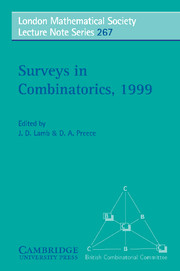Book contents
- Frontmatter
- Contents
- Preface
- The Rado Lecture
- The Invited Lectures
- Polynomials in Finite Geometries
- Applications of Combinatorial Designs to Communications, Cryptography, and Networking
- Random Walks on Combinatorial Objects
- Bose–Burton Type Theorems for Finite Projective, Affine and Polar Spaces
- Geometric Graph Theory
- Recent Excluded Minor Theorems for Graphs
- Parity, Cycle Space, and K4-Subdivisions in Graphs
Bose–Burton Type Theorems for Finite Projective, Affine and Polar Spaces
Published online by Cambridge University Press: 05 May 2013
- Frontmatter
- Contents
- Preface
- The Rado Lecture
- The Invited Lectures
- Polynomials in Finite Geometries
- Applications of Combinatorial Designs to Communications, Cryptography, and Networking
- Random Walks on Combinatorial Objects
- Bose–Burton Type Theorems for Finite Projective, Affine and Polar Spaces
- Geometric Graph Theory
- Recent Excluded Minor Theorems for Graphs
- Parity, Cycle Space, and K4-Subdivisions in Graphs
Summary
Summary We study the following two problems in finite projective, affine and polar spaces of dimension d. Given integers 0 ≤ s, t ≤ d what is the cardinality of the smallest set T consisting of subspaces of dimension t with the property that every subspace of dimension s is incident with at least one element of T? Likewise, what is the cardinality of the largest set T consisting of subspaces of dimension t with the property that every subspace of dimension s is incident with at most one element of T? Bose and Burton solved the case t = 0 of the first question for projective spaces in 1966. We survey the known results, present some open problems, and prove new results for finite polar spaces.
Introduction
Consider a finite projective, affine or polar space of dimension d and two integers s and t with 0 ≤ s, t ≤ d and the following problems.
Problem 1: What is the smallest cardinality of a set T of t-subspaces such that every s-subspace is incident with at least one element of T?
Problem 2: What is the largest cardinality of a set T of t-subspaces such that every s-subspace is incident with at most one element of T?
Much attention has been paid to particular cases of both problems in the last 30 years. This article gives a survey and several new results concerning Problem 1. Some results concerning Problem 2 are mentioned too.
- Type
- Chapter
- Information
- Surveys in Combinatorics, 1999 , pp. 137 - 166Publisher: Cambridge University PressPrint publication year: 1999
- 7
- Cited by



